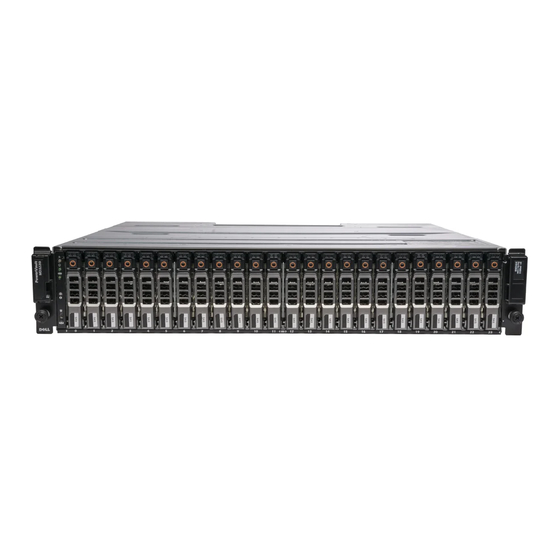Dell PowerVault MD3220i Series Technical Manualbook - Page 31
Browse online or download pdf Technical Manualbook for Storage Dell PowerVault MD3220i Series. Dell PowerVault MD3220i Series 38 pages. Storage arrays
Also for Dell PowerVault MD3220i Series: Deployment Manual (41 pages), Update Manual (32 pages), Rack Installation Instructions (2 pages), Installation Manual (18 pages), Information Update (1 pages), Manual (16 pages)

DELL PowerVault MD3200i/MD3220i Technical Guide Book
Supported RAID Configurations
Table 5.
Data is striped
Description
across multiple
physical disks.
Min # of physical
disks in a disk
group
Max # of physical
disks in a disk
group
Usable capacity as
% of raw capacity
Application
IOPS | MB/s
Performance due to
Advantages
operation of the
No redundancy.
Disadvantages
One physical disk
fails, data is lost
Virtual Disk Configuration
A virtual disk is a logical structure on a
storage array for data storage. A virtual
disk is created by slicing a disk group into
a stripe set with a defined capacity. Each
disk group supports up to one or more
virtual disks and a
maximum of 256 virtual
disks
per MD3200i series of storage
system. During the virtual disk creation
process, the user specifies the capacity of
the virtual disk and the virtual disk name.
Additional settings include preferred
controller ownership and a virtual disk-to-LUN mapping parameter (See Storage Partitioning section).
Configuration Metadata
MD3200i series of controllers store configuration metadata in a private 512 MB region on every
configured physical disk. This metadata area contains physical disk state and status information,
virtual disk state and status information and controller and subsystem information. The metadata on
RAID-0
RAID-1 and 1+0
Data is "mirrored"
to another physical
disk.
1
2
96
96
100%
50%
IOPS
Performance as
parallel
multiple requests
can be fulfilled
access
simultaneously
Storage costs are
doubled
RAID-5
Physical disks operated
independently with data
and parity blocks
distributed across all
physical disks in the group.
3
30
66.67% to 96.67%
IOPS | MB/s
Good for reads, small IOPS,
many concurrent IOPS and
random I/Os. Parity
utilizes small portion of
raw capacity.
Writes are particularly
demanding
Disk Group A
Disk
Disk
Disk
2
1
RAID-6
Physical disks operated
independently with data
and dual parity blocks are
distributed across all
physical disks in the group.
4
30
50% to 93.33%
IOPS | MB/s
Same advantages as RAID-5
but with better data
protection. Two hard
drives can fail without
losing access to data.
Overhead on writes will be
slightly more demanding
than RAID-5
Virtual Disk
Marketing
Disk
4
3
29
